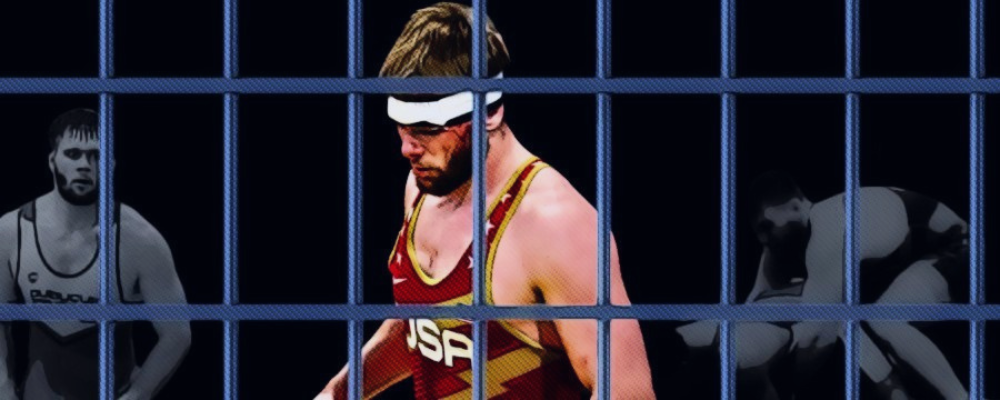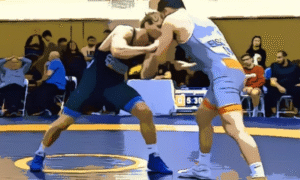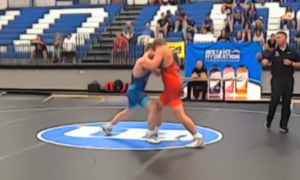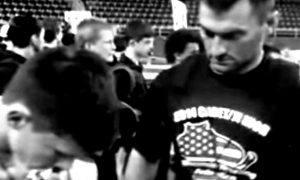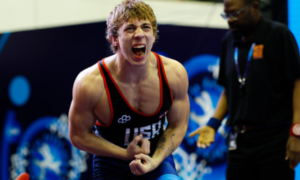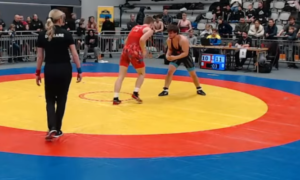With the beginning of a new Olympic cycle now having arrived, the United States is in need of capable upper-weights who still have their best days ahead of them — but not just to fill out the roster. No, the country must require of its athletes equal measures talent, toughness, and commitment. Eli Pannell (97 kg) checks all three of those boxes and is thus projected to find himself in the mix at 97 kilograms as the race to LA 2028 gets underway.
Pannell, 23, has ventured into full-time Greco-Roman wrestling via the more traditional route associated with the Americans’ participation in the sport. Originally from Illinois, Pannell was a high school state champion who also excelled in football — and at first desired pursuing both sports upon entering college. Difficult to do, though he considered it. But, as is so often the case, Pannell’s heart veered more towards wrestling and its hefty demands. He enrolled at Wartburg University in the fall of ’19 and went on to compete all four years, along the way experiencing feelings of encouragement as well as frustration. Pannell developed into a strong and dependable collegiate heavyweight, but, for whatever reason, his potential had not quite reached its apex. There was more in the tank when his time at Wartburg was up, and he knew it.
He had gotten a taste of what continuing on in Greco might entail in ’21 after placing 3rd at the U20 Pan-American Championships. So, it was an option, just not — at least not then — his main concern. But a seed that had been planted earlier began to bud come the spring of ’23. Pannell was fixing to assert his wares at the US Open in Las Vegas where an encounter with World champ/Olympic silver medalist Dennis Hall changed his trajectory. Pannell had arrived in Vegas sans a coach; and Hall, who by then had just completed his first year as assistant coach for the University of Dubuque, stepped in to corner the prospect. Pannell was eligible for a 5th college wrestling season and had transferring on his mind. His encounter with Hall helped seal the deal that eventually ushered him to Dubuque.
In the time since, Pannell has shown to be a quick study in the classical style of wrestling. And there have been more than a few matches and moments which have served to demonstrate the type of potential he wields to, he hopes sooner rather than later, reach the top of the pecking order both in the US and abroad. But he also has his struggles. They are not uncommon. Thus far, the one hangup to which Pannell has been forced to adjust is… scarcity. These days, the United States does not avail as many competitive opportunities as it had in the past. Less tournaments on domestic soil, for younger athletes like Pannell, means limited chances to test new techniques and tactics. It is a topic that hits home (no pun intended) for many American Greco prospects who plea devotion to the cause. That, and a current lack of training partners, have proven early obstacles for Pannell as he endeavors to chase his goal of World hardware, but these obstacles shall remain temporary provided his progression continues at a brisk pace.
Pannell betrays all of the attributes usually tethered to successful USA Greco big men. He is long, strong, boasts relevant collegiate experience, has forged a promising body of work, and is willing to push himself past the breaking point if it means breaking someone else when scores are kept. For the next step to become attainable, he just needs to bulldoze through that which confines him. Like most, he just needs some more opportunities to grow, more chances to discover what he can do.
He just needs to be let out of his cage.
5PM Interview with Eli Pannell
5PM: Tell me about growing up wrestling in Illinois. At what age did you start wrestling?
Eli Pannell: I had a few matches when I was in 6th grade but I didn’t really start until I was in 7th grade. I did the IKWF, not the IASA, so we would always travel to the IKWF tournaments. We would try to hit every tournament that we could. Sometimes two per weekend if we could manage to fit that in. Honestly, my little brother started wrestling before me. We had this coach at the time whose sons played football. One of his sons actually wrestled for Euclair College and was an All-American for them. But he basically persuaded our dad to get us to join wrestling. He said that it would get us better at football. I’m a big football player, as well, and I love that sport just as much I love wrestling.
5PM: I saw that. I saw that you have a Hudl profile.
EP: Yeah, I got all-state for football my senior year. These were the only two sports I played, though. I didn’t play any other ones. I just did offseason wrestling when I was not wrestling or playing football.
5PM: That you did not start wrestling until 6th or 7th grade, at this stage of your life do you see that as a benefit? I ask only because it seems as though so many who start wrestling at very young ages burn out after a while. There is also a school of thought which says that 6th/7th grade might actually be the best age to start wrestling.
EP: I was the only graduating senior from my high school who has kept wrestling. I had a bunch of buddies who wrestled at different points in their lives and they ended up getting burnt-out. I think it just really depends on the individual. I have been doing two-a-days for the last year-and-a-half to two years, trying to get two practices in through the week. Sometimes I don’t do that, obviously, especially when on a break like this. I think it is all about the person. I guess if you are getting your kid into wrestling that you kind of have to gauge how much they are into it themselves as opposed to how much you are into it.
I don’t know. I had a big problem picking which sport to play in college. When I would go on visits, it just seemed that, on average, wrestling teams were a lot closer with one another than football teams. I went on one visit with two buddies who were in the same graduating class. They went to the same college, played on the same team, and never hung out with each other (laughs). It’s like they weren’t friends anymore. It was weird. It was beyond me. Honestly, I wish I would have started earlier. It makes boys into men, and it helped me with other sports. It helped me with football. I also play a little bit of rugby. That’s just for fun, but wrestling helps with that, too.
5PM: You wound up winning a state title your senior year of high school and you had only begun wrestling around the time you were in middle school. How rapidly did you come into your own during high school to reach that kind of level?
EP: My freshman year I had a .500 record. I was 20-20 and wrestling at 145 pounds. I kind of got beat up by a lot of upperclassmen. It seemed like every other dude I was wrestling had a tattoo on their arm or something (laughs). But then I went 30-15. I had more matches my sophomore year. I had wrestled in the regionals my freshman year but did not make it out of there; and then I did not get to wrestle regionals during my sophomore year because of an injury. My junior year I took 6th at state.
I’d say that the turning point was doing Greco-Roman and freestyle. I had started doing that during the summer after my sophomore year. I went to Fargo. Didn’t qualify, I petitioned in and wrestled Greco. Had a blast doing that. Then I was developing the upper-body. I never shot in high school. I didn’t shoot too much in college, either. I think I just fell in love with the big throw, making the crowds go “oooh” and stuff (laughs). I guess that’s the best way to describe that. I like being a showman. Plus, there is nothing better than getting a pin. We never had a full team in high school so we always needed as many points as we could get. That last year at duals, it always came down to me and someone at the end, one of the heavier weights getting the pin. It is kind of like a secret weapon, I guess, Greco-Roman wrestling.
5PM: How did learning the international styles influence you more specifically during those last two years of high school?
EP: It felt like I could dictate the match whenever I got into underhooks or over/unders. I was very much more comfortable in that situation and would voluntarily put other wrestlers in those positions. I’m just strong there. I went 39-0 my senior year and I think that I only had four matches that weren’t pins, with three of them against the same guy. My first match at the state tournament I think was the only one in which I didn’t hit a throw. I got headlocked my junior year in the wrestlebacks. I was super-mad because after he headlocked me, he stalled the rest of the period. I brought it up to my freestyle/Greco coach at the time. I was going to a freestyle/Greco club out in Moline (Illinois). It’s at St. Ambrose College now and is run by Stuart Terronez, and he’s a phenomenal coach. Super good coach. I think that I’ve had the best coaches a guy could ask for at this point. Even while at Wartburg, those guys. They did everything they could, I think.
5PM: Coming out of high school, you were a dual-sport prospective athlete. You were excellent at football and a state champion wrestler. You also liked Greco, but there was not yet a thought about pursuing Greco-Roman wrestling at that time, right?
Eli Pannell: No, there was not. It was just all about going to college, getting my degree, and trying to win a national championship.
5PM: Did you know then that was an option at a place like Northern Michigan?
EP: No, actually, I did not know about Northern Michigan. I wasn’t too big into Greco. I knew of the guys from Illinois like Kamal Bey, and of course the Braunagels. But as far as the history of it and where you could go… I didn’t know what WCAP (Army’s World Class Athletes Program) was. I guess the big clubs like Sunkist Kids and Titan Mercury, I knew about those. But I didn’t really start getting into it until after that Pan-Ams (’21). And I was thinking about not even going to the U20 qualifying tournament for that. But I was at Wartburg at the time and they were like, ‘You might as well..’. I had went to one earlier in the year and placed 3rd at that. So, we ended up doing it and I haven’t looked back since.
I was in the process of transferring schools the last time the US Open was in Vegas, which was in ’23. I went out there, and without a coach, actually. Then I talked to Darryl Aiello and asked him if he wanted to warm up. He was like, “Yeah, I’m warming up with Rulon Gardner if you want to join us.” I warmed up with them and Rulon wasn’t wrestling in the tournament, so Dennis (Hall) asked if he could coach me. I got to talking with him, and the rest is history. They thought that I had a pretty good showing at that first US Open. I beat the 5th seed in the first round (Robert Barbour) and actually lost to George (Sikes) the next round. I didn’t place at the tournament but it was my first US Open.
5PM: Let’s backtrack just a little. You wrestled at Wartburg for four years and that is a very well-known wrestling school. How do you look back at your time attending Wartburg?
EP: I’d say that it was tough. There was a lot of tough competition in the room. They had very high standards there. Practices were equally as tough as they are at Dubuque as far as how it was ran. They just had more wrestlers in their program. But when I transferred to Dubuque, it was made to be about me. Dennis wanted me as his athlete.
Even this summer, we had our heavyweight, who hadn’t been wrestling too much during the summertime. I’m just out here riding him. I’m not known for being good on top (in folkstyle), but I’m riding him and he’s 50, 60 pounds heavier than me. And he asked me, “Man, what did you do this summer?” And it was like, I don’t even know. Just working with Dennis every single day. My brother and I would just scrap with each other, mostly hand-fighting and some Greco stuff with just a little bit of folkstyle because he’s still doing it. Dennis does a really good job of coaching how to feel the sport. There is a difference in going out there and feeling it, feeling what’s there. You can get into a flow state. Dennis has kind of shaped my perspective on how to be taught, on how to get coached, how to approach a match, and what to do when I’m faced with adversity.
5PM: I often ask former collegiate wrestlers if, knowing what they do now, would they go back and switch to Greco sooner. I don’t ask this as though one should regret having wrestled folkstyle in college but I think it is taken that way. How do you feel about this question?
EP: I would say that Dennis hasn’t been in Dubuque as long as I’ve been in college. But if that were the case, if that option were on the table, I probably would have chosen to go with Dennis. I only had one visit, had only talked with Dennis a handful of times, and had other prospects to consider as far as transferring somewhere else. But you know, Dennis is an awesome guy and a great coach. So, I think if I could go back and change something, I would have played football – but then I never would have done that because then I would not have met Dennis.
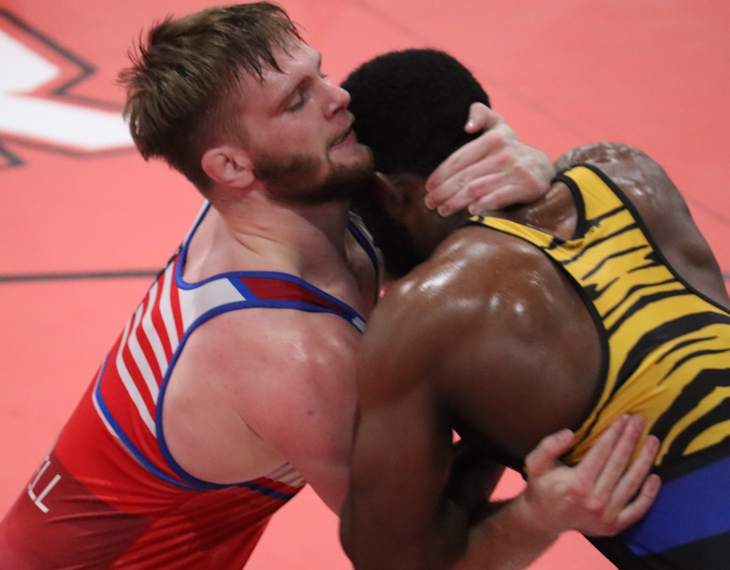
5PM: Since Greco has become your premier style, is there anything that you have developed from a skill-set perspective that you have found surprising? Is there an area that you have also found frustrating?
Eli Pannell: Hmmm. I would say that the 50/50 positions are hard when we both have over/unders locked on both sides. I’m still having issues with this against certain wrestlers. With shorter, more squat wrestlers, it is harder for me to get my hips in there because they are bent-over and closer to the ground. That’s one thing, but I have gotten way better at doing arm drags. I had been arm-dragging with the wrong foot inside, or I wouldn’t step around far enough when I was stepping to the outside. So right now, especially, I am getting way better at arm drags.
I’d say that the hardest part of the sport is probably that 50/50 from on-the-feet. Because, your opponent, he is going to be giving you options based on what you do. If you grab his wrist and he re-grabs, then maybe you get a drag. There are all sorts of things. He is going to present attacks to you. You just have to know how to respond at that moment. You need to feel that, feel what you need to do, and it has to be fluid for it to be successful.
5PM: You seemed to be positioned well for an opportunity to challenge for the U23 World Team spot this past spring but you took a tough loss in the quarterfinal (to Tereus Henry) after holding a lead, and then that tournament ended for you in disappointing fashion…
EP: I knew that was going to be a tough tournament, and significantly more challenging than the year before. I had trained for it with that anticipation and it was heartbreaking. I will not lie to you, it was hard to bounce back from that. I’ve wrestled (Mike) Altomer (Altomer had defeated Henry one round hence at the U23 Trials) since then at the OTC. I mean, I can compete with these guys. But they showed up that day and it just didn’t happen for me.
5PM: Well, where I was going with this is that the U23 Nationals was six months ago and you are already much improved compared to then it would seem like.
EP: I would say so. I have definitely become more confident in my style. And I have gotten more aggressive. I have learned to be meaner, especially when it is 0-0 and I need to be the aggressor, maybe get him put down… I think the problem there was that I wasn’t physical enough in the hand-fighting and it especially cost me that match.
5PM: Between high school and then five years of college wrestling, you became accustomed to staying competition-ready all the time due to having dozens of matches per season. Greco in the US is different. We have a severe shortage of events with a lot of time in between them. Has this been tough for you?
Eli Pannell: Yeah, I was hoping that we would talk about this. I am desperately in need of partners. The fact that we don’t have a lot of competitions is tough. I don’t get to test my abilities too often. I did get to go out to the OTC (US Olympic and Paralympic Training Center), which was a really nice experience; but as far as competitions, that is the only place I have gone to over these past five months. After the U23 Trials, I have been to the OTC twice and that’s about it. I didn’t go to the Bill Farrell this year…
5PM: Well you didn’t go to the Bill Farrell I imagine because you knew that you were going to the OTC to train with the Ukrainian team, anyway.
EP: Yeah. I mean, if I could have gone to the Bill Farrell, I would have. I just need more mat time. That’s what Dennis is always preaching to me. Like, ‘Hey, you just need to keep going.’ Right now, we don’t have too many people who can compete with me in the room. We have a guy who will be going 87 kg for the U20 tournament but he is battling an ACL tear right now. I’ve just been wrestling our heavyweight who I think is ranked 11th in the country for Division III. He has been doing really well. So, that’s been good. But as for partners my own size, there is no one who can compete with me. Our heavyweight doesn’t really do Greco. He’s a big body, super-strong kid, but it’s different. His feel is different when I’m in the ties with him, as opposed to a Joe Rau or someone like that. I mean, he’s strong, but he doesn’t know what he’s doing (in Greco).
5PM: It’s like you’re caged.
EP: Yeah.
5PM: As someone who has your competitive attitude, and skill-set, this must drive you crazy.
EP: At the US Nationals in Dallas (‘23 Olympic Trials Qualifier, December), I came out so flat because I hadn’t really wrestled. I think that maybe we had a tournament and a dual for folkstyle, but I had skipped those because I didn’t want to wrestle heavyweight. I was wrestling 97 kg (in Greco) for a bunch of different things and was battling an MCL (medial cruciate ligament) injury, as well.
But yes, I think that having more tournaments would benefit so many athletes. You’re not going to practice big throws all the time on your own teammates, even with a crash pad. I’d rather wrestle someone who is going to bring that same fight to me. A competition where they will be going 100%. You’re not going to be doing that in the room because that is how injuries happen. I would never throw a salto on my own teammate. I would never do that. I would never do that, at least not unless I could take him all the way over and know that he isn’t going to post. But I would hit a salto live, like I did at the OTC, because I don’t get to practice that stuff enough. That’s why I think having more competitions would benefit me, because I can’t put the stuff I’m practicing into action until I wrestle live.
5PM: As of now, what does your training cycle look like over the next three-plus months leading to the World Team Trials in April?
EP: Well, I will probably be doing a Greco practice in the morning and wrestle with the heavyweight from folkstyle in the afternoon. Dennis wants me running three times a day. I’m actually pretty light right now. I’m only like 218, 220 pounds (98-99 kg). He wants me to bulk up to around 230 before the Trials so that I could cut down and be a little bigger. Because, Joe Rau, that’s a thick dude right there. I’m a little bit skinny for the weight class right now.
So, a lot of running. A lot of sprints, I should say. Then probably a lot of on-the-feet work. I’m pretty confident in my par terre. It has never been my issue. It has always been on-the-feet. I think a lot of hand-fighting and being put in positions in which I’m not comfortable, like that 50/50 position. And a lot of mental preparation, too. I think that is super-important. I like to go into Dennis’ office to let him know what’s on my mind.
5PM: At 23, you’re still very young, especially for an upper-weight. Big-picturing it, if you could come up with the perfect scenario for you both competition and training-wise, what would it look like?
Eli Pannell: The Ukrainians would be coming over for one or two months. We would get them housing. I wouldn’t mind paying out of pocket for that, although it wouldn’t be cheap, I’m sure (laughs). But that would be ideal, having them over. I talked to Joe Rau a little bit about training, so I’d like to train with him at some point, at least before he retires. I think that I would really like to get on the ladder this year, if not win the whole thing. I know that those are pretty big aspirations, but you have to dream big to accomplish your goals.

Listen to “5PM57: Kamal Bey and David Stepanyan” on Spreaker.
Listen to “5PM56: Rich Carlson and Spencer Woods” on Spreaker.
SUBSCRIBE TO THE FIVE POINT MOVE PODCAST
iTunes | Stitcher | Spreaker | Google Play Music


